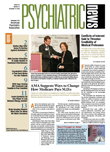Medicaid spending will double in 10 years, a projection based on its current rate of growth, according to the program's first actuarial report. The program's enrollment is expected to grow steadily from 50 million to 55 million over that decade.
The spending growth rate, as projected by the Centers for Medicare and Medicaid Services (CMS), is significantly higher than the current inflation rate and will place an increasing strain on states, which along with the federal government fund Medicaid.
“This report should serve as an urgent reminder that the current path of Medicaid spending is unsustainable for both federal and state governments,” said Mike Leavitt, secretary of Health and Human Services.“ If nothing is done to rein in these costs, access to health care for the nation's most vulnerable citizens could be threatened.”
The report is CMS's first long-term spending projection for Medicaid since the program's inception in 1965. (The agency has long produced 75-year projections of Medicare expenditures for the annual report of the Medicare Board of Trustees.)
The “2008 Actuarial Report on the Financial Outlook for Medicaid” found that Medicaid expenditures would grow from $333.2 billion in Fiscal 2007—$190.6 billion, or 57 percent, in federal spending and $142.6 billion, or 43 percent, in state spending—to more than $673 billion by Fiscal 2017.
The report projected that Medicaid spending will grow by nearly 8 percent annually, compared with a projected annual average gross domestic product growth of 4.8 percent.
The expected rise in Medicaid's costs, according to the report, will stem from the growing number of enrollees, rising wage and price inflation in the medical sector, availability of a wider array of health care treatments, and the use of more complex and expensive medical services.
The projected increase in Medicaid spending comes as many states have begun to report that enrollments have spiked due to rising unemployment amid the ongoing financial downturn. Most state Medicaid programs expect to face budget shortfalls next year as the nation's economy stalls and demand for public health care assistance continues to rise, according to an annual survey of state program directors released in September.
Other findings of the actuarial report include that in Fiscal 2007 average per-enrollee spending was $6,120, Medicaid spending was 14.8 percent of all U.S. health care spending in 2006, and the program was the largest general revenue expenditure on health care for both the federal and state governments. Medicaid accounted for 7 percent of the federal budget in 2007 and is expected to consume 8.4 percent of the budget by 2013.
The dramatic growth in Medicaid spending did not surprise mental health advocates. The projected increases in Medicaid costs fit with the rising costs of medication and the level of care needed for the seriously ill population that the program serves, according to Laurence Miller, M.D., chair of APA's Committee on Public Funding for Psychiatric Services.
“Medicaid [serves] more of a chronic disease population,” Miller said. “You just can't ignore those people, and if you did, then the impact of that would be even worse for the economy.”
He said federal and state policymakers face a difficult “balancing act” regarding Medicaid because they have to weigh managing costs with ensuring access to medical care.
The report arrives at a time when some health care advocates are urging the use of Medicaid as a vehicle for expanding health care access to the nation's 47 million uninsured people (Psychiatric News, November 7).
Sen. Max Baucus (D-Mont.) issued a health care expansion blueprint in November that listed among its goals expansion of Medicaid eligibility to all people whose incomes were up to 100 percent of the federal poverty level. Baucus, one of the leading congressional voices on health care reform, plans to introduce legislation in 2009 to implement his blueprint (see
Ambitious Health Reform Plans Take Shape in Senate).
Such an expanded role for Medicaid fits with the popular but mistaken belief that all low-income people are qualified for coverage under the program. Medicaid eligibility is limited to low-income children and adults who fall into one of nearly 50 categories of eligibility, such as pregnant women.
Miller said he was uncertain of the impact that Medicaid's large projected future growth costs would have on plans to expand it as part of the effort to reform the U.S. health care system, but he believes that any change is likely to start with Medicaid's core focus: children.
“As the new administration expands the focus of health care it will start with kids, which will affect the budget,” he said.
